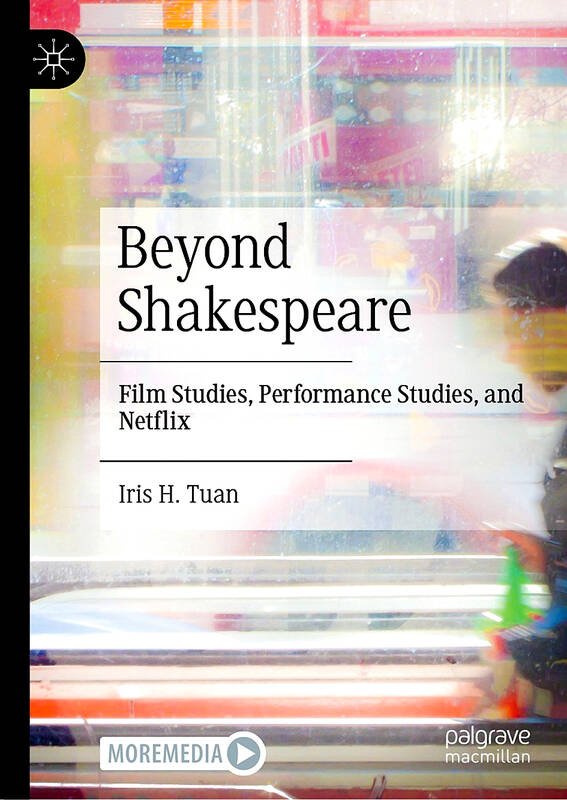Iris Tuan (段馨君) is a professor at Taiwan’s National Yang Ming Chiao Tung University, with strong links to Harvard. Her previous work Pop with Gods, Shakespeare, and AI was full of a wide range of topics, such as feminism, post-structuralism and films of Shakespeare — Baz Luhrmann’s beautiful Romeo and Juliet, for instance.
What will Beyond Shakespeare be like?
Well, there was a plague in Shakespeare’s time (Lear, Macbeth and Titus Andronicus were written during plague years), food and drink in Shakespeare (audiences ate and drank during his plays), sonnets, zombies, touring theater companies, Stan Lai (賴聲川), David Henry Hwang (黃哲倫) and Downton Abbey.

There is, in other words, a similar eclecticism in this book, together with a constant emphasis on performance. Tuan’s PhD was in theatre studies. If a play has been filmed, made into a TV series or just simply performed, Iris Tuan rakes it in as grist for her comprehensive mill.
Titus Andronicus is interesting, full of horrors such as people having their hands chopped off and biting out their tongue (though Thomas Kyd’s Spanish Tragedy also has a tongue bitten off and spat out). It’s conceivable that such grotesqueness was considered only suitable for an aristocratic audience, and in a time of plague, when the public theaters were closed, a private performance for ticket-buying gentry was the only option. Of course, the on-stage blinding of Gloucester in King Lear was certainly visible to all comers, so you can never be sure. Anyway, there was a time when people considered Titus Andronicus was too horrific to be by Shakespeare at all, until, that is, Peter Brook directed a sensational production at Stratford in 1955 that made it look like a masterpiece.
THE LIVING DEAD
What does Tuan mean by zombies? Normally the word refers to dead people who are supposedly brought back to life. In this book, Tuan opts to look at two films that are in effect zombie versions of Romeo and Juliet, (Warm Bodies, 2013), and Titus Andronicus (Titus, 1999). In these, the “living dead” represent fear, anxiety, disorder and global crisis.
As far as travelling theater companies in Shakespeare’s time, the most famous instance in the plays is in Hamlet. Tuan makes the comparison with COVID-19, inevitably. She goes on to cite Cervantes, the great Spanish playwright, who never met Shakespeare but who died on the same day that he did.
A Hakka play, Hold on, love! , that derives from, among other things, Shakespeare’s great comedy As You Like It, comes next. And in many chapters Shakespeare’s Sonnet Number 116 (“Let me not to the marriage of true minds”) features. A side-note here is that this book stays with Shakespeare far more than did its predecessor, Pop with Gods.
Stan Lai and David Henry Hwang get a chapter each. Lai’s plays Secret Love in Peach Blossom Land (1992) and River/Cloud (2021) are prominent, while David Henry Hwang’s controversial Flower Drum Song (1961) — controversial on account of racial questions over its casting; should the lead character be Asian or European? — and M. Butterfly (1988) receive close analysis.
DEAD READERS
Tuan refers to us as “dear readers” in her chapter on the “neo-noir” Altered Carbon (2018 - 2020), referring back first to Ridley Scott’s Blade Runner of 1982. Issues such as the possibility of sex with the body of a deceased boyfriend, plus “sex, violence, class, power, death, desire, dreams, memories, eroticism, immortality and AI” all feature in this analysis of Altered Carbon.
Downton Abbey, as in the film Downton Abbey 2019, feels a little out of place here, partly because it is British and was filmed some 65 miles from London. Much use, incidentally, is made of Lisa Blackman’s book Immaterial Bodies, Affect, Embodiment, Meditation, though many items not formally analyzed are quoted, even To Be or Not to Be.
Whether our author is considering productions of Shakespeare’s Merchant of Venice that continue to represent Shylock as the archetypal Jewish villain, whether she’s anxious to show Downton Abbey is continuous with American movies as well as profoundly different from them, whether she’s quoting, in her conclusion, Virginia Woolf’s extended essay A Room of One’s Own (which argues that women writers need a room of their own and a private income to succeed), or whether she refers back to Shakespeare, endlessly in reality, her fundamental precept is that theatre represents life, as do all the other forms of performance art including ice-skating.
This, then, is an ambitious book, as was its predecessor. Both books take on a huge amount of material and rake in other works to support Tuan’s analysis. She is in the tradition of bilingual Taiwanese academics who add splendor to both of the countries they have worked in. That her current permanent position is in Taiwan says a lot.
That being said, it remains the case that the majority of the works discussed are non-Taiwanese, with the exception of Lai and Hwang.
But the very mix, of Taiwanese and non-Taiwanese, is of the essence in this book. Tuan is nothing if not a polymath, and this is a central pillar of her strength as a critic. The sheer breadth of her reading (she refers to “an office of her own”) makes it very hard to be critical.
So all praise to Palgrave MacMillan for championing this author and to the National Yang Ming Tung University for granting her a professorship.

July 28 to Aug. 3 Former president Chiang Kai-shek (蔣介石) reportedly maintained a simple diet and preferred to drink warm water — but one indulgence he enjoyed was a banned drink: Coca-Cola. Although a Coca-Cola plant was built in Taiwan in 1957, It was only allowed to sell to the US military and other American agencies. However, Chiang’s aides recall procuring the soft drink at US military exchange stores, and there’s also records of the Presidential Office ordering in bulk from Hong Kong. By the 1960s, it wasn’t difficult for those with means or connections to obtain Coca-Cola from the

No one saw it coming. Everyone — including the Chinese Nationalist Party (KMT) — expected at least some of the recall campaigns against 24 of its lawmakers and Hsinchu Mayor Ann Kao (高虹安) to succeed. Underground gamblers reportedly expected between five and eight lawmakers to lose their jobs. All of this analysis made sense, but contained a fatal flaw. The record of the recall campaigns, the collapse of the KMT-led recalls, and polling data all pointed to enthusiastic high turnout in support of the recall campaigns, and that those against the recalls were unenthusiastic and far less likely to vote. That

Taiwan is today going to participate in a world-first experiment in democracy. Twenty-four Chinese Nationalist Party (KMT) lawmakers will face a recall vote, with the results determining if they keep their jobs. Some recalls look safe for the incumbents, other lawmakers appear heading for a fall and many could go either way. Predictions on the outcome vary widely, which is unsurprising — this is the first time worldwide a mass recall has ever been attempted at the national level. Even meteorologists are unclear what will happen. As this paper reported, the interactions between tropical storms Francisco and Com-May could lead to

A couple of weeks ago the parties aligned with the People’s Republic of China (PRC), the Chinese Nationalist Party (KMT) and the Taiwan People’s Party (TPP), voted in the legislature to eliminate the subsidy that enables Taiwan Power Co (Taipower) to keep up with its burgeoning debt, and instead pay for universal cash handouts worth NT$10,000. The subsidy would have been NT$100 billion, while the cash handout had a budget of NT$235 billion. The bill mandates that the cash payments must be completed by Oct. 31 of this year. The changes were part of the overall NT$545 billion budget approved